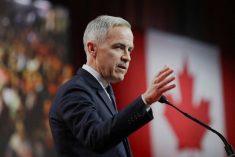Labour, internet access among the challenges in rural communities discussed at Recognizing Rural Canada event in Ottawa
The problem of rural connectivity had a moment in the spotlight in Ottawa in late April.
Politicians and business leaders highlighted the issue during the Recognizing Rural Communities discussion, led by former MP Candice Bergen. The event featured two panels.
Bergen said federal politicians must better understand that Canada has a diversity of rural communities and different approaches are needed to meet their specific needs.
Read Also

Lower canola seeding rates can pay off: study
Research shows lower canola seeding rates improve emergence and root systems, boosting yields in dry years while cutting input costs.
“Many of those challenges can only be addressed through a really focused effort, sector by sector.”
Accessible broadband internet and the need for reliable web connectivity in rural areas was a primary focus.
Gudie Hutchings, minister of rural economic development, spoke about her experience with this issue in the largely rural riding of Long Range Mountains in western Newfoundland.
“We heard from rural Canadians that broadband internet was the equalizer for economic development and for life,” she said.
She said broadband can help long-distance learning, career support and medical care and “it’s given families peace of mind.”
Dan Mazier, a Manitoboa MP and shadow minister of rural economic development, called rural Canada “the lifeline that fuels our country’s growth and prosperity,” but also acknowledged the gap in internet access that could prevent rural Canada from reaching its full potential.
“That means unlocking our abundant natural resources, including our energy and agriculture, not only for ourselves, but for the rest of the world. However, to fully harness this potential, we must address a pressing need, the need for high-speed internet and cellular connectivity.”
The first panel, Putting Rural Canada on the National Agenda, featured Liberal MP Francis Drouin, Conservative MP Lianne Rood and NDP MP Taylor Bachrach.
Drouin said a major concern in his Ontario riding of Glengarry-Prescott-Russell is the “exodus” of youth to Ottawa and Montreal. “Remote working, that’s a huge opportunity for us now, but we need access to internet.”
Bachrach, meanwhile, noted the challenge in recruiting health-care professionals to rural areas.
“We’re seeing emergency rooms put on diversion, people having to travel to other communities to access emergency services because there aren’t enough doctors. We need to ask ourselves: how do we create vibrant and sustainable communities that doctors and nurses want to move to?”
Rood said rural Canadians do not have enough options for fibre-optic internet.
Connecting “the last mile” to networks is an often noted challenge, she said, while other residents complain of “simply not having access even to basic cell phone service in some areas where, you know, farmers are very reliant on technology now, more than most people realize.
“Not having access to cell phone service, to the internet, availability to run the programs in their tractors, when you’re field mapping or you’re trying to test different places in your soil, it makes it very difficult.”
Investment and growth
The second panel, Business and Investment in Rural Canada, included Forest Products Association of Canada CEO Derek Nighbor, Canadian Telecoms Association CEO and former P.E.I. premier Robert Ghiz and Cathy Jo Noble of the National Cattle Feeders’ Association.
Ghiz said connectivity is “one of the themes to the solution.”
“We want to be able to connect more people. The more customers you have, the better off you do.”
But cost is a problem. Ghiz said most Canadians have access to broadband internet but the disparity grows when looking at rural communities.
“If you look at rural Canada today, rural Canada is only 67 per cent connected to home internet. That’s a lot of connectivity that needs to take place.”















